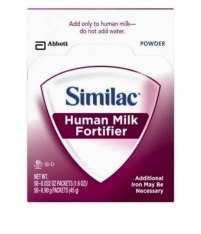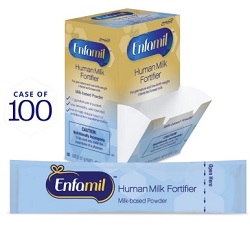 A woman whose premature baby died after being fed a cow’s-milk-based formula is suing the companies that made and marketed it. The plaintiff has filed a petition in Illinois’ Madison County court for a jury trial against defendants named as Mead Johnson & Company, LLC, Mead Johnson Nutrition Company, and Abbott Laboratories.
A woman whose premature baby died after being fed a cow’s-milk-based formula is suing the companies that made and marketed it. The plaintiff has filed a petition in Illinois’ Madison County court for a jury trial against defendants named as Mead Johnson & Company, LLC, Mead Johnson Nutrition Company, and Abbott Laboratories.Necrotizing Enterocolitis (NEC)
The action – filed Nov. 23, 2021 – arises out of injuries suffered by a premature infant who was given the defendants’ cow’s milk-based infant feeding products.
The complaint states:
“Defendants’ products caused (the baby) to develop necrotizing enterocolitis (‘NEC’), a life-altering and potentially deadly disease that largely affects premature babies who are given cow’s milk-based feeding products. As a result, (the baby) was seriously injured, resulting in his death and harm to Plaintiff.”
The plaintiff is a resident of Wyoming. Defendant Mead Johnson Nutrition Company is a corporation, incorporated under the laws of the State of Delaware; but its principal place of business is Illinois. Defendant Mead Johnson & Company, LLC, is organized under the laws of the State of Delaware. Defendants Mead Johnson Nutrition Company and Mead Johnson & Company, LLC, (together, “Mead”) are manufacturers of cow’s milk-based infant feeding products and market many of these products under the “Enfamil” brand name.
Defendant Abbott Laboratories (“Abbott”) is a corporation, incorporated under the laws of the State of Illinois, and its principal place of business is in Illinois. Abbott is a manufacturer of cow’s milk-based infant feeding products and markets many of its products under the “Similac” brand name.
JURISDICTION AND VENUE
The claim was filed in Illinois because the court there has general jurisdiction, as both Mead Johnson and Abbott Laboratories maintain their principal place of business in Illinois, and Abbott Laboratories is incorporated in Illinois.
Case Facts: Baby Ingested Similac and/or Enfamil Products
 The baby boy was born prematurely at the University of Utah Hospital in Salt Lake City, Utah on November 21, 2019. Shortly after his birth, he was fed Similac and/or Enfamil products, cow’s milk-based products. The complaint claims that shortly after first ingesting Defendants’ products, he developed NEC.
The baby boy was born prematurely at the University of Utah Hospital in Salt Lake City, Utah on November 21, 2019. Shortly after his birth, he was fed Similac and/or Enfamil products, cow’s milk-based products. The complaint claims that shortly after first ingesting Defendants’ products, he developed NEC.The baby was then forced to undergo surgery. He subsequently succumbed to his injuries, dying on December 8, 2019.
The petition reads:
Cow’s Milk-Based Feeding Products are Known to Cause NEC
- NEC is a devastating disease that is the most frequent and lethal gastrointestinal disorder affecting preterm infants. NEC develops when harmful bacteria breach the walls of the intestine, causing portions of the intestine to become inflamed and often to die. Once NEC develops, the condition can progress rapidly from mild feeding intolerance to systemic and fatal sepsis. Up to 30 percent of NEC-diagnosed infants die from the disease.
- Preterm and low-birth-weight infants are especially susceptible to NEC because of their underdeveloped digestive systems. Extensive scientific research, including numerous randomized controlled trials, has confirmed that cow’s milk-based feeding products cause NEC in preterm and low-birth-weight infants, which in turn may lead to other medical complications, surgeries, long-term health problems, and death.
- In one randomized, multicenter study of 926 preterm infants, NEC was six to ten times more common in exclusively cow’s milk formula-fed babies than in exclusively breast milk-fed babies and three times more common in babies who received a combination of formula and breast milk. For babies born at more than 30 weeks gestation, NEC was 20 times more common in those fed only cow’s milk formula than in those fed breast milk.
- Another randomized controlled trial showed that preterm babies fed an exclusive breast milk-based diet were 90% less likely to develop surgical NEC (NEC that requires surgical treatment), compared to preterm babies fed a diet that included some cow’s milk-based products.
- Yet another study that analyzed the data from a 12-center randomized trial concluded that fortification of breast milk with a cow’s milk-based fortifier resulted in a 4.2-fold increased risk of NEC and a 5.1-fold increased risk of surgical NEC or death, compared to fortification with a breast milk-based fortifier.
- A Surgeon General report, The Surgeon General’s Call to Action to Support Breastfeeding, warns that, “for vulnerable premature infants, formula feeding is associated with higher rates of necrotizing enterocolitis.” The report also states that premature infants who are not breastfed are 138% more likely to develop NEC.
- The American Academy of Pediatrics, says the petition: “[A]n organization of 67,000 pediatricians committed to the optimal physical, mental, and social health and well-being for all infants, children, adolescents, and young adults,” has advised that all premature infants should be fed either their mother’s milk or, if their mother’s milk is unavailable, pasteurized human donor milk. This recommendation is based on the “potent benefits of human milk,” including “lower rates of . . . NEC.
- A multicenter, randomized, controlled trial found that premature and low-birth weight infants fed an exclusive breast milk-based diet suffered NEC only 3% of the time while premature and low-birth-weight infants receiving cow’s milk-based formula suffered NEC 21%
of the time. - Another study conducted a randomized comparison of extremely preterm infants who were given either (a) a diet of breast milk fortified with a breast milk-based fortifier or (b) a diet containing variable amounts of cow’s milk-based products. The babies given exclusively
breast milk products suffered NEC 5% of the time. The babies given cow’s milk products suffered NEC 17% of the time.
Safer, Nutritionally Superior Alternatives To Cow’s Milk-Based Products Exist
- A range of options are available that allow preterm and low-birth-weight infants to be fed exclusively human milk-based nutrition. For example, in addition to the mother’s own milk, an established network delivers pasteurized donor breast milk to hospitals nationwide. Moreover, hospitals have access to shelf-stable formula and milk fortifiers derived from pasteurized breast milk.
- A diet based exclusively on breast milk and breast milk fortifiers provides all the nutrition necessary to support premature and low-birth-weight infants without the elevated risk of NEC associated with cow’s milk-based products. For example, in a study analyzing preterm infants who were fed an exclusive breast milk-based diet until they reached 34 weeks, all 104 infants exceeded standard growth targets and met length and head-circumference growth targets, demonstrating that infants can achieve and mostly exceed targeted growth standards when receiving an exclusive breast milk-based diet. This is particularly true given the ability of breast milk-based fortifiers to provide the additional nutritional supplements necessary for adequate growth while receiving the protective benefits of a breast milk diet.
- Defendants’ products not only pose a threat to infants’ health, but also displace the breast milk they could otherwise receive. This displacement only increases infants’ vulnerability to NEC, as studies show that breast milk protects against the disease. For example, a study analyzing 1,587 infants across multiple institutions concluded that an exclusive breast milk-based diet is associated with significant benefits for extremely premature infants and that it produced no feeding-related adverse outcomes.
Defendants’ False And Misleading Marketing Regarding Cow’s Milk Based Infant Products
The petition also accuses Abbott and Mead of aggressively marketing their cow’s milk-based products as medically endorsed and nutritionally equivalent alternatives to breast milk, including prior to the plaintiff’s baby’s birth.
The petition reads:
“Abbott’s and Mead’s marketing approach includes targeting the parents of preterm infants while they are still in the hospital with messages that Defendants’ cow’s milk formulas and fortifiers are necessary for the growth and development of their vulnerable children. Often
these tactics implicitly discourage mothers from breastfeeding, which reduces the mother’s supply of breast milk. None of Defendants’ marketing materials, including their promotional websites, reference the science showing how significantly their products increase the risk of NEC.”
The complaint also states that several studies have shown the detrimental impact of formula advertising on the rates of initiation and continuation of breastfeeding, including “studies that show that as ‘hand feeding’ (non-breastfeeding) advertisements increase, reported breastfeeding rates decrease in the following year.”
$4.48 Million in Marketing Non-human Milk
The complaint states that defendants and formula manufacturers are willing to spend massive sums to disseminate their message, with one study estimating that formula manufacturers collectively spent $4.48 billion on marketing and promotion in 2014 alone.
WHO Code of Marketing of Breast-milk Substitutes
Recognizing the abuse and dangers of infant formula marketing, in 1981, the World Health Assembly – the decision-making body of the World Health Organization – developed the International Code of Marketing of Breast-milk Substitutes (“the Code”), which required companies to acknowledge the superiority of breast milk, the negative effect on breastfeeding of introducing partial bottle-feeding, and the difficulty of reversing the decision not to breastfeed. The Code also forbade advertising or other forms of promotion of formula to the
general public, as well as providing sample products to mothers or members of their families.
While Abbott and Mead acknowledge the Code on their websites and claim to support the effort to encourage mothers to breastfeed for as long as possible, this is little more than lip service. Instead, Defendants’ aggressive marketing exploits new parents’ darkest fears –
that the nutrition they are supplying to their child will not provide the best chance of survival – while wholly failing to warn that their products come with a significantly increased risk of NEC.
Legal Representation
The plaintiff is represented by attorneys Yvette Diaz, David P. Matthews and Tim Goss.
RELATED
- Infant Formula Lawsuit Necrotizing Enterocolitis
- Free Legal Consultation
- Toxic Baby Food Lawsuit
- Baby Foods contain Toxic Heavy Metals

by Matthews & Associates




